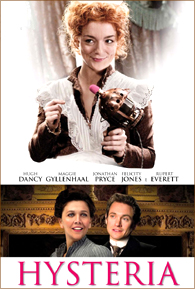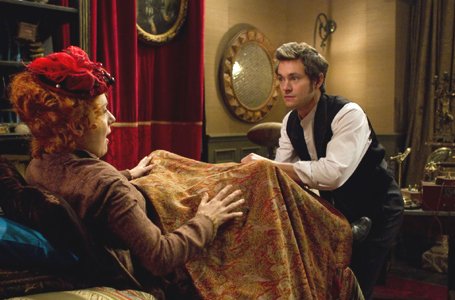
It's a pity that the second volume of Aristotle's Poetics is lost to posterity. Tragedy is easy to perform and write because Aristotle has identified the beast, catalogued its habits, and sent it to a taxidermist so we could study it. Comedy, on the other hand, is hit and miss; no one can agree on what's funny and what's not. And even when we can identify several types of comedy and comic styles, there's no one unifying field theory to explain the mysterious force that makes us smile at a joke.
So what makes a film about the invention of the vibrator (i.e. the best friend of every girl and some guys too) such a riotous comedy? The chief reason why Hysteria works is the evocation of its period setting. Would you believe that in the Victorian age, hysteria was believed to be an actual women's ailment requiring pelvic massages to be performed once a week by medical doctors? As a certain scene in Woody Allen's only science fiction comedy has it, it's pretty funny when the prevailing scientific paradigm of the day turns out to be precisely the opposite of what we now know to be true.
A bare bones account of what Victorian scientists believed about hysteria, its causes, and its cures should be enough to set one chuckling but the entire cast delivers an unshakeable certainty that's so misplaced and terribly wrong with such deadpan sureness and earnestness that this incongruity becomes funny in itself. Jonathan Pryce provides the most laughs as an earnest expert in feminine issues who initiates Rupert Everett's newcomer doctor into the business of pelvic massages. The more businesslike the two men take their duties, the more they insist that a pelvic massage is not an erotic experience for a woman, and the more their patients squeal out in their 'paroxysms' which are not to be confused with orgasms...why, the funnier and more absurd the film gets.
Yet Hysteria is not entirely a silly, giggle-inducing story about the invention of the vibrator and how wrong people were about human sexuality and medicine. It's also a social-minded comedy about the beginnings of women's rights in Great Britain, starring Maggie Gyllenhaal as a suffragette and socialist as well as a romantic comedy between the suffragette and the young doctor.
Hysteria would have been good enough as a one-joke comedy about scientists getting it dreadfully wrong or how perhaps it would be better to take an entirely clinical approach to sex education but it's so much better as a farce, comedy of manners, and romcom all rolled into one.

